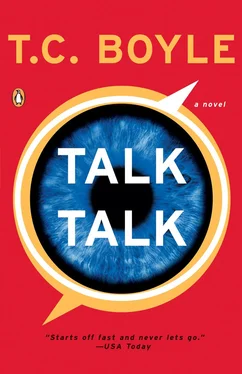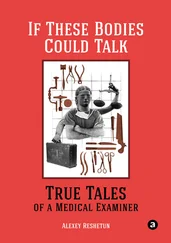The landscape sprang away from them. The dash gave and released, their two hands pounding. And then a car appeared in the inside lane and rolled silently past them and he shifted his eyes to her, his smile opening up, and he sang for her, sang to her, more insistent now, more vigorous and emphatic, his lips, his lips: “Who, who, who, who?”
She hadn't thought past the moment, past packing her bags and the two new credit cards she'd got to replace the canceled ones, because it had all seemed so natural, so logical: the thief was in Mill Valley and he had a postbox at Mail Boxes Etc. and they were going to go there and find him, watch him, stalk him. And then what? Call in the police. In her fantasy she saw him striding into the shop to check his mail while they sat outside in the car-they knew his face, but he didn't know theirs-and punched 911 into the cell phone. Or they'd get the mail themselves, find an address, an account number, trace him to his house and nail him there (yes, “nail” him, as you would nail a board to the floor). And in the fantasy she saw a SWAT team swooping down on him, men in flak jackets and protective headgear, candy-apple-red lights flashing on the cars, the helicopter slamming at the air, and she'd confront him then, spit in his face as he was led away in the same inflexible restraints they'd bound her up in, and she'd confront him again in court, the perfect witness in perfect control, the interpreter motionless at her side.
But that was the fantasy. The reality-and it made her stomach clench to think of it-might be less certain, might be dangerous. How stupid was he? How much in love with her base identifiers could he be when he knew he'd been found out? He might be a thousand miles away by now, more than a match for any amateur detective, and with a new name and a new persona. He could be anywhere. He could be anybody. But still, the thought of what he'd done to her without pause or conscience or even a trace of human feeling made her seize with the rage she'd felt all her life, the rage of shame and inadequacy and condescension. Revenge, that was what she wanted. To make him hurt the way she did. Only that.
They'd just passed King City when she looked up next. Bridger was no longer slapping the dash, no longer singing. He had one hand draped over the wheel, fingers dangling, and he was slumped down in the seat, looking tired. Or wiped, as in “wiped-out, eliminated, destroyed.” She touched his arm and he turned his head. “Are you tired?” she asked. “You want to maybe stop for lunch?”
He nodded and that was good enough because she couldn't very well expect him simultaneously to keep his eyes on the road and his lips in her field of vision. But then he turned full-face and said, “What do you feel like-Mexican?”
“Sure,” she said.
He was grinning even as he swung off the freeway and onto the main street-the only street-of a town that consisted of a grocery, a gas station, a cantina and two cramped and competing “taquerias” called La Tolteca and El Sitio respectively. “Good choice,” he said, turning to her as he killed the engine.
They chose El Sitio and couldn't have said why, no appreciable difference between the two places, both dark inside because electricity cost money, both run by the wives, grandparents and children of the men in the fields. There were four tables shoved up against the wall, a chest-high counter, the kitchen. The smells were dark and lingering, but good, a dense aroma of ancient chiles, refried beans in a pot crusted with residue, peppers and onions and the fry pan that was always hot. One of the tables was occupied by two super-sized white women with unevenly dyed hair-travelers like themselves-who were staring moodily down at the foil-wrapped remains of their burritos and clutching bottles of Dos Equis as if they were fire extinguishers. An old man, lizard-like in a white smock and trousers, sat at the table behind them, tentatively poking a pink plastic fork at a plate of scrambled eggs and beans. There was a handwritten menu on the wall.
Bridger consulted the menu a moment, then turned to the woman at the counter. He said something Dana didn't catch-was he speaking in Spanish, was that it? — and then looked to her. “You know what you want?”
“I don't know,” she said, using her hands unconsciously. She looked to the menu and back again. “I can order for myself.”
The woman behind the counter, as reduced and small-boned as a child, though her hair was going gray, watched them impassively. She was there to take their orders and their money and to give them a plastic chit with a number on it and to call out the number when the orders came up, and her eyes betrayed little interest beyond that. The menu was in Spanish: “taco de chuleta; taco de rajas; taco de cazuela; tamal de verduras.” It wasn't a problem. Dana had lived in San Roque for more than a year now and she knew the basics of Mexican cuisine as well as she knew Italian or French or Chinese, and to make it easier for her, since she wasn't prepared to wrestle with the pronunciation-English was challenge enough-there was a number attached to each item. She chose the fifth item on the list, “tostada de polio,” turned to the woman and said, as clearly as she could, “Number Five, please.”
For a long moment the woman merely examined her out of eyes so dark there was no delineation between iris and pupil, and then she looked to Bridger and said something in her own language, which Bridger, at first, didn't seem to understand. She had to repeat herself, and then Bridger nodded, the pale bristles of his hair gone translucent in the long shaft of sun leaching in through the door. “She says she'll have the Number Five,” he said, and then repeated himself in his high school Spanish.
They took the table behind the two women-What percentage of Americans were obese? Thirty percent? Was that the figure she'd read? — and Bridger got them their drinks. He was having “horchata,” she a Diet Coke, out of the can. The women behind them were hunkered over the table, their faces animated, inches apart, exchanging confidences-gossip-and Dana almost wished she could hear what they were saying about their husbands, boyfriends, their ailments and beauty treatments and the children who invariably disappointed them. Instead, she asked Bridger what the woman at the counter had said. “And why didn't she understand me? Wasn't I clear?”
He dropped his eyes. “No, it wasn't that. Or it was. She's-well, her English isn't too good-”
“Yes? But what did she say?”
He looked embarrassed-or reluctant-and she felt her face go hot.
“It was something insulting, wasn't it?”
“I don't know,” he said, and then he said something she couldn't make out.
“It was in Spanish?”
Instead of repeating it again, uselessly, he pulled a pen from his pocket and wrote the word out for her on the back of a paper napkin: “Sordomuda.”
Now she did flush. “Deaf-mute?”
He nodded.
What she wanted to ask was, “How did she know?” but instead she glanced across the room to where the woman sat perched on a stool behind the cash register, her head down, flipping through the pages of a Mexican tabloid; she wore gold earrings, the faintest points of light; a silver cross dangled from her throat on a silver chain. She was perfectly ordinary, like a thousand other women in a thousand other taco stands, Mexican restaurants and “pupuserias,” a woman who knew the feel of the mortar and pestle and the consistency of the “harina” paste shaped to fit the hand and pounded flat between the palms. But who was she? Did she have a deaf son? A deaf sister? Was she deaf herself? Or was she just superior? Contemptuous? Hateful?
Everything was in stasis, but for the right arm of the cook-a man so small and slight he might have been the cashier's brother-which jerked rhythmically as he slid the pan back and forth across the gas burner. After a moment, she turned back to Bridger and signed, “How did she know?” but all he could do was shrug and hold out his hands. When their order came up, he went to the counter and brought back a paper plate and set it before her. The dish it contained didn't look like a tostada. For one thing, there was no shell; for another, no lettuce. Instead, what she got seemed to be some kind of organ meat in gravy and a wash of melted cheese.
Читать дальше












